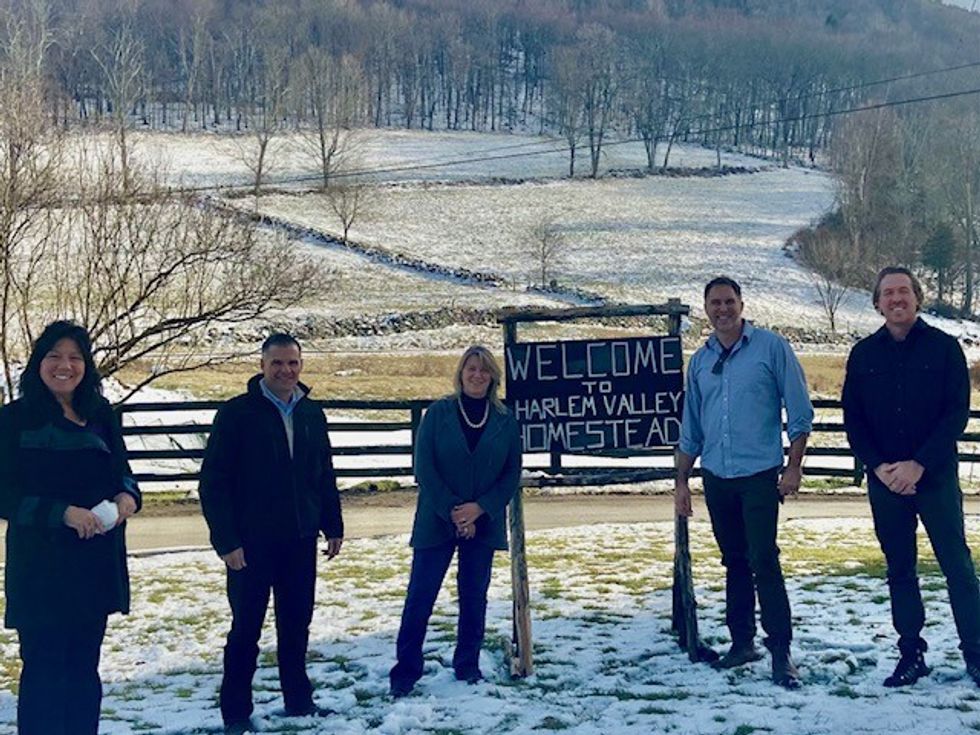WINGDALE — Friday, Jan. 14, was a very good day for the growingly popular working farm Harlem Valley Homestead (HVH) — and it’s going to be growing even more very soon — thanks in no small part to Dutchess County Executive Marc Molinaro and New York State Senator Sue Serino (R-41).
The lawmakers were instrumental in securing HVH $500,000 from the Empire State Development Grant Program through the Mid-Hudson Regional Economic Development Council to begin the farm’s “hospitality expansion.”
The Empire State program offers financial aid to projects that “promote New York State’s economic health by facilitating job creation and/or retention, or increased business activity in the state,” according to the www.ny.gov wesbsite.
Molinaro and Serino toured the Wingdale farm on the 14th to announce the grant award.
HVH’s vision of what it sees “down the road,” according to its website, www.harlemvalleyhomestead.com, explains its expansion plans, the very definition of agri-tourism, below:
“In the future, our agricultural production will grow to support our mission to connect guests with transformational experiences around living in connection with land. Guests will stay for multi-day workshops, participate in the work of the farm, share meals with ingredients grown here, and enjoy the spectacular beauty of the Harlem Valley. To support this vision we are in the process of creating sustainable facilities so that more people can come and experience this place more fully.”
Harlem Valley Homestead
The 250-acre farm that employs eight full-time workers and has been holding community volunteer work days year-round since its founding, is located at 147 Old Forge Road in the Dover hamlet of Wingdale.
It’s lovely, with wide-open acreage where it raises cows that “feast on fresh pasture during the summer and fermented hay in the winter.”
It also uses sustainable practices such as rotational grazing to sequester carbon and to improve the health of its soil and the quality of its pastures.
The farm also grows a variety of vegetables and flowers “bred for taste, beauty and abundance,” and uses both organic fertilizer and manure from its own animals.
HVH breeds non-GMO pigs, which are raised in the woods eating roots, nuts and berries and living what sounds like an ideal life for animals ultimately headed to the butcher. It also raises chickens in pastures that eat grasses, foliage and bugs as well as certified organic grain.
The homestead keeps bees as well, whose honey is unpasteurized and unprocessed. As the honey comes “straight from the hive,” it promises to be as sweet and as flavorful and as nourishing as everything else produced from this local farm.
Lest we forget that mushrooms are also cultivated at this treasure trove in Wingdale, where “a diverse variety of seasonal gourmet mushrooms” are grown from May through November on sawdust and organic grain that gets harvested daily.
OK, so is it any wonder that HVH, which began the homestead’s mission around 2018 on land snuggly nestled between the Appalachian Trail and the Tenmile River, has been selected as the recipient of the what Serino’s office is calling “the largest grant in Dutchess County [which] was assisted in the process by letters of support from [Sen. Serino] and [the] county executive?”
Considering how coveted the Empire State Development Grant Program is, and how tough it is for a farm — make that a farm in the oft-forgotten northeastern section of the county — to rake in half a million bucks — but taking into account all that HVH has to offer, then not really. Especially once you add the lure of agri-tourism into the mix.
“The Harlem Valley Homestead is a true Hudson Valley gem,” stated Serino. “With agri-tourism on the rise, this working farm takes a unique approach to preserve farmland, engage visitors and help them form a direct connection with the land…This major grant will enable HVH to become a premier tourist destination, and to inspire countless others to develop an appreciation for our natural environment and a respect for the tremendous amount of work that goes into operating a farm and homestead… I am looking forward to seeing their unique vision become a reality.”
The county executive clearly agrees.
“Since Dutchess County’s founding, agriculture has played an integral role in our community’s heritage, and agriculture continues to contribute to our local economy to this day — employing our friends and neighbors while feeding an untold number of residents, both within our county and outside our borders,” Molinaro stated in a press release. “This grant will allow HVH… to welcome even more visitors — from around the corner and around the world — who will enjoy the splendor of this magnificent farm.”
Josh Viertel, co-founder of HVH, added that he is excited about how many more people the farm will be able to impact thanks to the grant.
“Today, our farm feeds more than 150 families in Dover and the region,” stated Viertel. “This grant will help us to create an enduring institution, a place that brings people to the region so that they can connect to the land and the story behind their food.
“If we are going to keep farmland in this region, it is vital that farms survive; farmstays, educational programs and sharing great local food and drink are all key to creating the conservation-based economic development that our community deserves and our farms need,” he emphasized.
A number of local residents took to Facebook to thank the lawmakers for helping to obtain the grant for HVH, and for bringing the money and the attention to the Harlem Valley.
Wingdale resident Stancy DuHamel, who serves on various volunteer boards and has long been involved in environmental issues, was among them.
“Thank you Senator Sue Serino and Dutchess County Executive Marcus Molinaro,” posted DuHamel, “for supporting a project that showcases everything that’s good about our town.”
This article has been updated to note that Stancy DuHamel spoke as a private resident.







 Submitted
Submitted







